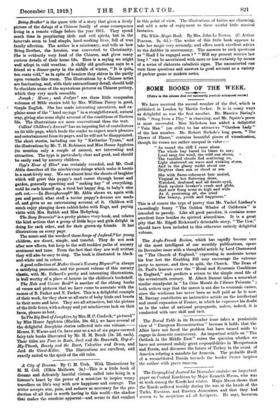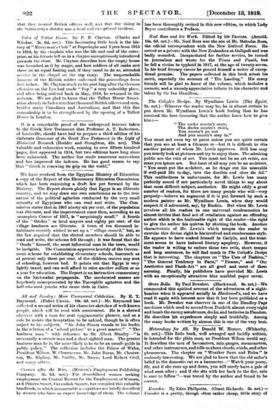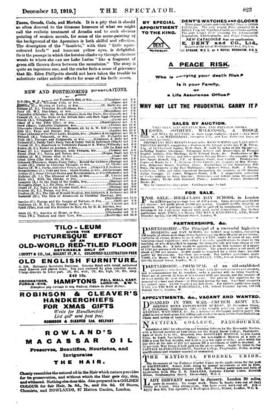SOME BOOKS OF THE WEEK.
(Yolks in this nolunin does not neceesartly preclude subsequent review.)
We have received the second number of the Owl, which is published in London by Martin Seeker. It is in many ways
as delightful as was the first number. Mr. Maurice Bar-inert little Song from a Play " is charming, and Mr. Squire's poem is most successful. Miss Nicholson has added a delightful " Vain Man " (on stilts) to her attractive "Careless Lady " of the last number. Mr. Robert Nichols's long poem, " The Flower of Flame," contains beautiful pieces of visualization,
though its verses aro rather unequal in value : " As round the cliff I came alone The whole bay bared its blaze to me ; Loud sang the wind, the wild sun shone,
The tumbled clouds fled scattering on, Light shattered on wave and winking stone, And in the glassy midst stood one Brighter than sun or cloud or sea.
She with flame-vehement hair untied, Virginal in her fluttering dress, Watched, deafened and all dazzle-eyed, Each opulent breaker's crash and glide, And now flung arms so high and wide As if, possessing all, she cried Ber beauty, youth and happiness."
This is of course the type of poetry that Mr. Vachel Lindsay's exceedingly funny " The Golden Whales of California " is intended to parody. Like all good parodies, it contains some excellent lines besides its spirited absurdities. It is a great pity that Mr. Edgell Rickword's detestable story, " The Cow," should have been included in this otherwise entirely delightful volume.
The Anglo-French Review, which has rapidly become one of the most intelligent of our monthly publications, opens its December issue with a thoughtful article by Lord Charnwood on " The Church of England," expressing in moderate terms his fear lest the Enabling Bill may encourage the extreme party to narrow, and then to split, the Church. The Dean of St. Paul's laments over the " Moral and Economic Conditions in England," and predicts a return to the simple rural life of the seventeenth century. M. Albert Dauzat takes a somewhat• similar standpoint in " La Criso Morale de l'Heure Presente " ; both writers urge that the unrest is not due to economic causes, since the workman has never been so well paid as he is now. M. Davray contributes an instructive article on the intellectual and moral expansion of France, in which he expresses his doubt as to the value of national propaganda, unless, indeed, it is conducted with rare skill and tact.
The Round Table in its December issue takca a pessimistic view of " European Reconstruction " because it holds that the Allies have not faced the problem but have turned aside to engage in domestic controversy. An important article on " The Outlook in the Middle East" raises the question whether we have not assumed unduly groat responsibilities in Mesopotamia and Persia, and discusses the future of Turkey in the event of America refusing a mandate for Armenia. The probable illwill of a reconstituted Russia towards the border States inspires the author with grave concern.
The Geographical Journal for December contains an important paper on Central Kurdistan by Major Kenneth Mason, who was at work amoeg the Kurds last winter. Major Mason shows that the Kurds suffered terribly during the war at the hands of the Turks, Russians, and Russian Armenians, and that they had reason to be suspicious o f all fercigners. He says, however, that they treated British officers well, and that the rising in the Sulaimaniya district was a local and exception-d incident.
Talts of Talbot House. By 1'. B. Clayton. (Chatto and ¶Vindus. 3s. 6cL net.)-This fascinating little book is the history of " Everyman's Club" at Poperinghe and Ypres from 1915 to 1918, by the chaplain who was the life and soul of the enterprise, as his friends tell us in a chapter surreptitiously introduced towards the close. Mr. Clayton describes how the empty house was furnished as if by magic, and how soldiers of all ranks met there on an equal footing and, if they cared to do so, attended service in the chapel on the top story. The unquenchable hunanu of the British soldier enlivened the proceedings from first to last. Mr. Clayton stuck to his post long after the German offensive on the Lys had made " Pop " a very unhealthy place., and after being ordered back in May, 1918, he returned in the autumn. We arc glad to know that the Talbot House Association already includes over four thousand British officers and men, besides many Canadians and Australians, and that this fine comradeship is to be strengthened by the opening of a Talbot House in London.
Tt is a remarkable proof of the widespread interest taken In the Greek New Testament that Professor A. T. Robertson, of Louisville, should have had to prepare a third edition of his 'elaborate Grammar of the Greek New Testament in the Light of Historical Research (Hodder and Stoughton, 42s. net). This 'valuable and exhaustive work, running to over fifteen hundred 'pages, first appeared in 1914, but two editions have long since been exhausted. The author has made numerous corrections and has improved the indexes. He has good reason to say that " Greek is renewing its grip on the world."
We have received from the Egyptian Ministry of Education a copy of the Report of the Elementary Education Commission which has been examining a draft law put forward by the Ministry. The Report shows plainly that Egypt is an illiterate country, and we may draw our own conclusions as to the true nature of the political agitation conducted by the very small minority of Egyptians who can read and write. The Com mission states that in 1907 ninety-six per cent. of the population was illiterate, and the improvement since then, according to an neompleto Census of 1917, is " surprisingly small." A fourth of the Onulas or local mayors and eighty per cent. of the village headmen are illiterate. A town of ten thousand inhabitants recently wished to set up a village council," but, as the raw required that the elected members should be able to read and write, the scheme fell through ; it was found that the
Ornda" himself, the most influential man in the town, would be ineligible. The Commission approves heartily of the Government scheme for establishing elementary schools, inasmuch as at present only three per cent. of the children receive any sort of schooling, however bad. It points out that Egypt is very lightly taxed, and can well afford to raise another million or so a year for education. The Report is an instructive commentary on the Nationalist propaganda. The uneducated masses are hopelessly misrepresented by the Turcophile agitators and the half-educated youths who cause riots in Cairo.
All and Sundry More Uncensored Celebrities. By E. T. Raymond. (Fisher Unwin. 10e. 6d. net.)—Mr. Raymond has collected a second series of his character-sketches of well-known people, which will be read with amusement. He is a shrewd observer with a turn for neat epigrammatic phrases, and as a rule he resists the temptation to be unkind, though he is often unjust to his subjects. " Sir John Simon stands to his leader in the relation of a school picture' to a great master." " The
business man with reference to Sir Albert Stanley--" is necessarily a narrow man and a short-sighted mau. The greater business man he is, the more likely is he to be an unsafe guide in public policy." The collection includes the Prince of Wales, President Wilson, M. Clemeneean, 4r. John Burns, Mr. Chesterton, Mr. Kipline, Mr. fimillie, Mr. Masse, Lord Robert Cecil, and many others.
Careers after the War. (Women's Employment Publishing Company. 3s. 6d. net.).-For demobilized women seeking employment the Central Bureau for the Employment of Women, at 6 Princes ytreet, Cavendish Square, has compiled this valuable handbook, in which innumerable occupations are briefly described by women who have an expert knowledge of them. The volume has been thoroughly revised in this new edition, to which Lady Bryce contributes a Preface.
Noel Ross and his Work. Edited by his Parents. (Arnold. 10e. (3d. net.)—Mr. Noel Roes was the son of Mr. Malcolm Rose, the official correspondent with the New Zealand Force. He served as a private with the New Zealanders at Gallipoli and was badly wounded. Incapacitated for further service, he turned to Journalism and wrote for the Times and Punch, but he fell a victim to typhoid in 1917, at the age of twenty-seven. In his brief literary career he proved himself a writer of exceptional promise. The papers collected in this book attest his merit, especially the account of " The Lauding." His many friends will be glad to know of the volume, which includes a memoir, and a warmly appreciative tribute to his character and talent by Sir Ian Hamilton_ The Caliph's Design. By Wyndham Lewis. (The Egoist.
3s. net.)—Whoever the reader may be, he is almost certain to put down Mr. Wyndham Lewis's book feeling that he has received the best trouncing that the author knew how to give him :— " Tho cocks mustn't crow, The ducks mustn't swim, You mustn't go out And you mustn't stay in."
You must not even try to paint unless you arc quite certain that you are at least a Cezanne or—but it is difficult to cite another painter of whom Mr. Lewis approves. Still less may you merely look at pictures and try to enjoy them. The admiring public are the ruin of art. You must not be an art critic, nos must you ignore art. But least of all may you be an architect, " You must put the architect, as he drags out his miserable
if well-paid life to-day, into the dustbin and close the lid." This crabbedness is unfortunate, for Mr. Lewis has many perfectly sound if not particularly novel things to say about that most difficult subject, aesthetics. He might edify a groat number of readers, for there are many people who will—very
properly—believe an argument if it is put forward by such a modern painter as Mr. Wyndham Lewis, when they would suspect it if advocated, say, by Ruskin. But when Mr. Lewis involves all his readers in one universal condemnation he
almost invites that final act of retaliation against an offending author which is the inalienable right of tho reader—the right to give the author his quietus by shutting the book. Another characteristic of Mr. Lewis's which tempts the reader to exercise this divine right is his involved and cumbersome style.
He appears to have soaked himself in Carlyle, and the treatment seems to have induced literary apoplexy. However, id the reader is willing to endure these two evils, short temps.' and long sentences, he will find much in The Caliph's Design that is interesting. The chapters on " The Uses of Fashion,"
" The General Tendency in Paris," " Picasso," and " Our Aesthetics and Plank-Art " are all good and most of them amusing. Finally, his publishers have provided bIr. Lewis with an exceptionally attractive blue marbled paper cover.
Green Balls. By Paul Bewsher. (Blackwood. 6s. net.)—We commended this spirited account of the adventures of a nightbomber when it appeared serially in Blackwood's, and we have read it again with interest now that it has been published as a book. Mr. Bewsher was observer in one of the Handley-Page machines which used to ascend from Dunkirk almost every night and bomb the enemy aerodromes, docks, and batteries in Flanders. He describes his experiences simply and truthfully. Among the many books written by airmen this is one of the very best.
Meteorology for All. By Donald W. Horner. (Witherb3r. 6s. net.)—This Tittle book, well arranged and lucidly written, is intended for the plain man, as President Wilson would say. It describes the uses of barometers, rain-gauges, anemometers, and other instruments, and tells us about clouds, winds, and other phenomena. The chapter on " Weather Saws and Rules " fs curiously interesting. We are glad to know that the old sailor's belief in the domestic cat as a barometer—" Watch your pussy, Sir, and if she runs up and down, you will surely have a gale of wind soon after ; and if she sits with her back to the fire, rain is sure to follow "--was tested by the author and found to be correct. Fauns, Oreads, Gods, and Mortals. It is a pity that it should so often descend to the tiresome humours of what we might call the realistic treatment of Arcadia and to such obvious pointing of modern morals, for some of the scene-painting of the background of the Apennines is both skilful and effective. The description of the fatmlets," with their " little agatecoloured hoofs " and innocent yellow eyes, is delightful. So is the passage in which the heroine climbs up through chestnut woods to where she can see Lake Larius " like a fragment of green silk thrown down between the mountains." The story is quite an ingenious one, and the reader feels a sense of grievance . that Mr. Eden Phillpotts should not have taken the trouble to substitute rather subtler effects for some of his facile scores.




















































 Previous page
Previous page